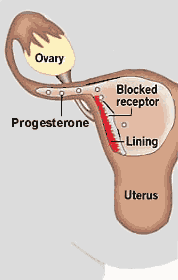![]() |What is RU-486? | The Discovery | The Chemistry |
|What is RU-486? | The Discovery | The Chemistry |
|The Global Use | RU-486 in US Politics |
| Cultural Controversy in the US | References |
![]()
![]()
![]()
![]() RU-486, or mifepristone, is a “synthetic steroid related to progesterone […] that mimics the action of progesterone […and therefore…] blocks the action of progesterone” (Kimball, 2008). As a progesterone antagonist, RU-486 is a synthetic molecule that opposes the action of a natural molecule, in this case, progesterone. By attaching itself to progesterone receptors, RU-486 blocks progesterone from taking up a receptor and therefore the necessary proteins to initiate and sustain pregnancy are not made (Kimball, 2008). Finally, RU-486 dilates the cervix leading to contractions that assist in displacing and eventually, expelling the embryo. Below is a basic diagram of where RU-486 acts:
RU-486, or mifepristone, is a “synthetic steroid related to progesterone […] that mimics the action of progesterone […and therefore…] blocks the action of progesterone” (Kimball, 2008). As a progesterone antagonist, RU-486 is a synthetic molecule that opposes the action of a natural molecule, in this case, progesterone. By attaching itself to progesterone receptors, RU-486 blocks progesterone from taking up a receptor and therefore the necessary proteins to initiate and sustain pregnancy are not made (Kimball, 2008). Finally, RU-486 dilates the cervix leading to contractions that assist in displacing and eventually, expelling the embryo. Below is a basic diagram of where RU-486 acts:
Molecular Formula: C29H35NO2
Chemical Structure:

